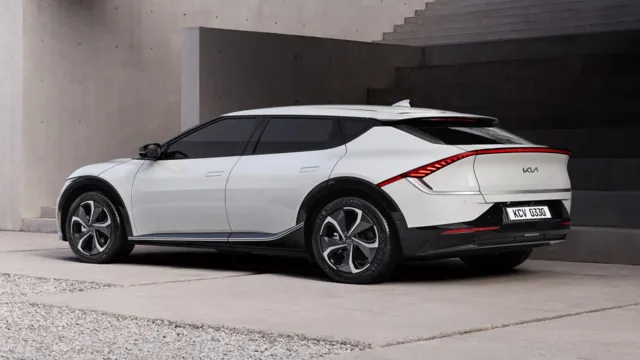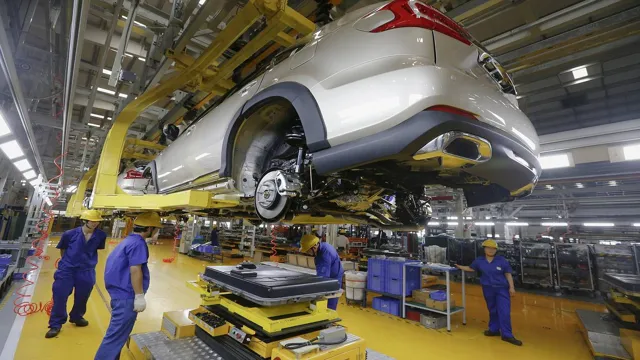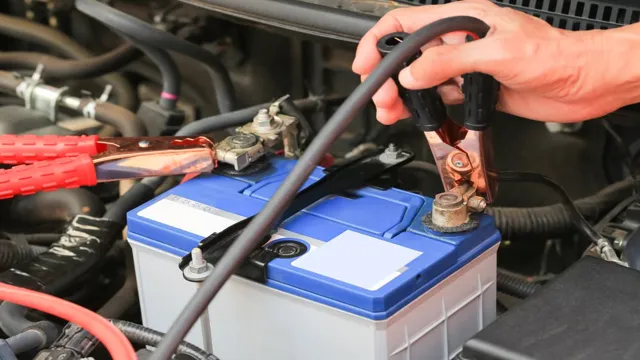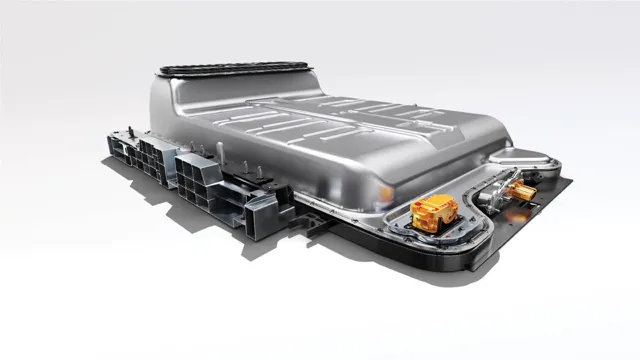Powering the Future: Benefits of the Best Battery for Your Electric Car
Electric cars have become increasingly popular over the past few years, and for good reason. They are environmentally friendly, cost-effective in the long run, and offer a smooth and quiet ride. One of the most crucial components of an electric car is its battery.
Electric car batteries are special batteries that can store and deliver energy to power up the car’s electric motor. They are designed to last long, and with technological advancements, they are becoming even more efficient. In this blog post, we will explore the advantages of electric car batteries.
Efficient Power Usage
When it comes to electric cars, one of the biggest concerns is battery life. With the rise of electric vehicles in recent years, manufacturers have been working hard to make sure their cars have an efficient power usage. This means that the battery in an electric car needs to be able to last for a long time before needing to be charged.
One of the ways that manufacturers are achieving this is by using advanced battery technology, such as lithium-ion batteries. These batteries are able to store more energy than traditional batteries, which means that electric cars can travel further on a single charge. Additionally, more efficient motors and regenerative braking systems are being used in electric cars to help conserve energy.
This means that when you apply the brakes, the motor acts as a generator, converting energy that would otherwise be lost into electrical energy, which can then be stored in the battery for later use. Overall, the trend towards more efficient power usage in electric cars has resulted in longer battery life, which is great news for both the environment and electric car owners.
How Electric Car Batteries Work
Electric car batteries are a relatively new technology that has taken the automotive industry by storm. These batteries are extremely efficient, making them ideal for powering cars, but also helping to reduce emissions. The way electric car batteries work is quite interesting.
Essentially, they are made up of a series of cells that store electricity. Each cell contains electrodes, which are charged when the battery is plugged into a power source. When you drive your car, the electricity stored in the battery is used to power the motor.
Because the batteries are so efficient, you don’t need to use as much power to get where you’re going, making them much more energy efficient than traditional gas-powered cars. Furthermore, electric car batteries can also be recharged, meaning that you can use them over and over again, making them a more sustainable and cost-effective option in the long run. Overall, electric car batteries are a great example of how technology can be used to create a more sustainable future for all of us.
Benefits of Battery-Powered Vehicles
One of the great advantages of battery-powered vehicles is their efficient power usage. Unlike traditional gas-powered cars, electric vehicles do not waste energy through combustion or friction in the engine. Instead, the electric motor directly converts the electrical energy stored in the battery into mechanical energy to move the wheels.
This means that electric vehicles use a much higher percentage of their energy for propulsion, leading to higher fuel efficiency and reduced greenhouse gas emissions. Furthermore, electric vehicles can also recover energy during braking by using regenerative braking systems, which convert the kinetic energy of the car’s motion into electrical energy to recharge the battery. With these efficient power usage strategies, battery-powered vehicles can offer cost savings and environmental benefits that make them an attractive option for many drivers.
Types of Electric Car Batteries
Electric cars rely on various types of batteries, each with unique features that cater to specific needs and requirements. Lithium-ion batteries are one of the most popular types of batteries in electric cars and are known for their high energy density and long lifespan. They are also lightweight and require minimal maintenance, making them an ideal choice for EV manufacturers.
Nickel-metal hydride batteries, on the other hand, are less commonly used but are reliable and relatively affordable. They have been used in hybrid electric cars for many years and are still used as the primary battery in some models. Another type of battery used in electric cars is the solid-state battery, which is currently in development but has the potential to offer high energy density and faster charging times than existing lithium-ion batteries.
Each type of battery has its advantages and disadvantages, and automakers consider several factors when selecting the appropriate battery type for their electric cars, including cost, performance, and safety. Regardless of the type of battery used, it is essential to understand that they play a crucial role in the performance, range, and charging capabilities of electric cars. Without these sophisticated batteries, it would be impossible for electric cars to compete with internal combustion engine-powered cars and their long-range capabilities.
Lead-Acid Batteries
Electric car batteries come in different types, and one of the most popular is the lead-acid battery. This battery technology has been around for over a century and is commonly found in traditional gasoline-powered vehicles. It is also widely used in electric cars due to its affordability and reliability.
Lead-acid batteries work by converting chemical energy into electrical energy, and they come in two variants: flooded and sealed. Flooded lead-acid batteries require regular maintenance, including adding distilled water to the cells, whereas sealed lead-acid batteries are maintenance-free. While lead-acid batteries are heavier and have a lower energy density than newer battery technologies, they are still a popular choice for small to medium-sized electric cars.
Since they are less expensive than other types of electric car batteries, lead-acid batteries are helpful for making electric cars more affordable for the average consumer.
Nickel–Metal Hydride (NiMH) Batteries
NiMH batteries are a common type of electric car battery. They have been used for several years and are a reliable option for powering electric vehicles. These batteries use a combination of nickel and metal hydride to store energy.
They are known for being relatively low-cost and easy to recycle. However, they do have some drawbacks compared to other battery types. For example, they are not as energy-dense as lithium-ion batteries, meaning that they require more space to store the same amount of energy.
Additionally, NiMH batteries can have issues with “memory effect,” which can reduce their overall lifespan. Nonetheless, NiMH batteries remain a popular choice for many electric car manufacturers, especially for hybrid vehicles that utilize both gasoline and electric power. Overall, NiMH batteries are a helpful piece of technology that plays an important role in the world of electric cars.
Lithium-Ion (Li-ion) Batteries
Lithium-ion (Li-ion) batteries are the most commonly used type of battery in electric cars. These batteries are popular because they have a high energy density, meaning they can store a lot of energy in a small space. There are two main types of Li-ion batteries: nickel-cobalt-aluminum (NCA) and nickel-manganese-cobalt (NMC).
NCA batteries are known for their high energy density and long lifespan, but they can be expensive and have lower discharge rates. NMC batteries, on the other hand, have a lower energy density but are more affordable and have higher discharge rates. Both types of batteries are used in electric cars, and the choice between them usually depends on the car’s specific requirements and the manufacturer’s preferences.
However, no matter which type of Li-ion battery is used, it is important to remember that all batteries have a limited lifespan and will eventually need to be replaced.
Factors to Consider When Choosing an Electric Car Battery
When it comes to electric cars, the battery is a crucial component. After all, it’s what powers the car! But, with so many options available, how do you choose the right battery for your electric car? One important factor to consider is the range of the battery. This refers to how far the car can travel on a single charge.
If you want to use your electric car for long trips, you’ll want a battery with a longer range. Another factor to consider is the charging time. Different batteries take different amounts of time to charge, and some may be more convenient for your schedule than others.
And, of course, there’s the cost. Electric car batteries can be expensive, so you’ll want to choose one that fits your budget. Overall, it’s important to do your research and consider all these factors before making a decision on which battery to choose for your electric car.
Range
When considering an electric car battery, one of the most important factors to keep in mind is range. Range refers to how far the car can go on a single charge. As an electric car owner, you will need to consider your daily driving needs to make sure you choose a battery with sufficient range.
For instance, if you commute long distances or take frequent road trips, you will need a battery with a longer range. It’s also worth noting that factors such as temperature, road conditions, and driving style can impact range. Therefore, it’s wise to choose a battery with a larger range than what you anticipate needing to compensate for any unexpected changes.
By considering range when selecting an electric car battery, you can ensure that you have a reliable and convenient mode of transportation without worrying about frequent charging stops.
Charging Time
When it comes to choosing an electric car battery, one of the most essential factors to consider is the charging time. The charging time for electric vehicles can range from a few hours to an entire day. However, there are several factors that affect the charging time of an electric car.
One of the main factors is the battery size, larger batteries take more time to charge while smaller ones may require less time. The charging infrastructure also plays a vital role, as having access to more powerful chargers and charging stations can significantly reduce charging time. Moreover, the temperature of the battery and the ambient temperature can also affect charging time.
Charging an electric car during extremely hot or cold temperatures can sweat the battery and reduce its overall efficiency. Ultimately, it is essential to examine these factors closely and choose a battery that meets your needs, whether it be for daily commuting or long-distance travel. By doing so, you can ensure that your electric vehicle forms an efficient and reliable means of transportation.
Wrapping Up with the Best Battery Choice for Your Electric Car
When it comes to choosing the best battery for your electric car, there are a few factors to consider. Firstly, the battery’s range is crucial to ensure that you can travel the distance you need without needing to recharge. Secondly, you should consider the battery’s charging time, aiming for a fast-charging battery to get you back on the road quickly.
It’s also important to consider the battery’s overall lifespan and how often it will need replacing. While some batteries may be more expensive upfront, they may save you money in the long run by lasting longer. Of course, you must ensure compatibility with your electric car model before making any purchase.
Taking into account these factors and doing your research can help you find the best battery for your electric car, providing you with safe and reliable transportation while reducing your carbon footprint.
Conclusion
In conclusion, the battery is the heart and soul of an electric car. It’s what gives the car its power and turns it into a eco-friendly and sustainable mode of transportation. Without a good battery, an electric car is nothing more than a fancy paperweight.
So if you’re considering purchasing an electric car, make sure to give the battery the attention and care it deserves. After all, it’s what’s going to keep you on the road for miles and miles to come! Move over gasoline, there’s a new power source in town – the mighty battery!
FAQs
How long does the battery last in an electric car?
The battery life in electric cars varies depending on the make and model, but generally, they last between 100,000 to 200,000 miles. Batteries also degrade over time and lose capacity, so they may need to be replaced after a certain number of years.
Can the battery be replaced in an electric car?
Yes, the battery in an electric car can be replaced. However, it can be expensive, and the cost varies depending on the make and model. Some manufacturers offer battery replacement programs or lease options to make it more affordable.
How long does it take to charge the battery in an electric car?
The charging time for an electric car battery depends on the charging station and the battery capacity. A level 1 charger (120 volts) can take up to 20 hours to fully charge a battery, while a level 3 charger (DC fast charging) can charge up to 80% in about 30 minutes.
What happens to the battery in an electric car once it can no longer be used?
Once the battery in an electric car can no longer be used, it can be recycled or repurposed. The materials in the battery, such as lithium and cobalt, can be extracted and reused in new batteries or other products. Recycling programs for electric car batteries are becoming more common as the number of electric cars on the road increases.





